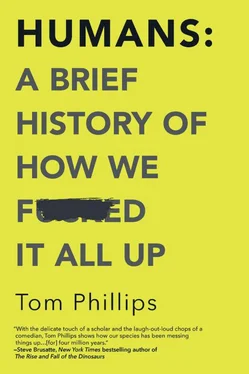Tom Phillips - Humans - A Brief History of How We F*cked It All Up
Здесь есть возможность читать онлайн «Tom Phillips - Humans - A Brief History of How We F*cked It All Up» весь текст электронной книги совершенно бесплатно (целиком полную версию без сокращений). В некоторых случаях можно слушать аудио, скачать через торрент в формате fb2 и присутствует краткое содержание. Город: Toronto, Год выпуска: 2019, ISBN: 2019, Издательство: Hanover Square Press, Жанр: История, Юмористические книги, на английском языке. Описание произведения, (предисловие) а так же отзывы посетителей доступны на портале библиотеки ЛибКат.
- Название:Humans: A Brief History of How We F*cked It All Up
- Автор:
- Издательство:Hanover Square Press
- Жанр:
- Год:2019
- Город:Toronto
- ISBN:978-1-48805-113-5
- Рейтинг книги:4 / 5. Голосов: 1
-
Избранное:Добавить в избранное
- Отзывы:
-
Ваша оценка:
- 80
- 1
- 2
- 3
- 4
- 5
Humans: A Brief History of How We F*cked It All Up: краткое содержание, описание и аннотация
Предлагаем к чтению аннотацию, описание, краткое содержание или предисловие (зависит от того, что написал сам автор книги «Humans: A Brief History of How We F*cked It All Up»). Если вы не нашли необходимую информацию о книге — напишите в комментариях, мы постараемся отыскать её.
Humans: A Brief History of How We F*cked It All Up — читать онлайн бесплатно полную книгу (весь текст) целиком
Ниже представлен текст книги, разбитый по страницам. Система сохранения места последней прочитанной страницы, позволяет с удобством читать онлайн бесплатно книгу «Humans: A Brief History of How We F*cked It All Up», без необходимости каждый раз заново искать на чём Вы остановились. Поставьте закладку, и сможете в любой момент перейти на страницу, на которой закончили чтение.
Интервал:
Закладка:
And finally, our desire to fit in with a crowd means that we’re extremely prone to fads, crazes and manias of all kinds—brief, flaring obsessions that grip society and send rationality out of the window. These take many different forms. Some can be purely physical, like the inexplicable dancing manias that periodically gripped Europe for about seven centuries in the Middle Ages, in which hundreds of thousands of people would become infected with a sudden and irresistible urge to dance, sometimes to death.
Other manias are financial, as our desire for money combines with our eagerness to be part of a crowd and to believe the stories of whatever get-rich-quick scheme is going around. (In London in 1720, there was such a frenzy of interest in investing in the South Sea that one group of chancers managed to sell stock described as “a company for carrying out an undertaking of great advantage, but nobody to know what it is.”) This is how we get financial bubbles—when the perceived value of something far outstrips its actual value. People start investing in the thing not because they necessarily think it has any intrinsic worth, but simply because as long as enough other people think it’s worth something, you can still make money. Of course, eventually reality kicks back in, a lot of people lose a lot of money and sometimes the entire economy goes down the pan.
Yet other manias are mass panics, often founded on rumors that play on our fears. That’s why witch hunts in one form or another have happened at some point in history in virtually every culture around the world (an estimated 50,000 people died across Europe during the witch manias that lasted from the sixteenth to the eighteenth centuries).
These are just some of the mistakes that recur with wearying predictability throughout the history of human civilization. But, of course, before we could start making them in earnest, we had to invent civilization first.
Outbreaks of inexplicable, uncontrollable dancing were common in much of Europe between the 1300s and the 1600s, sometimes involving thousands of people. Nobody’s entirely sure why.
Around the same time, mass panic at false rumors of wells being poisoned were also common—normally blamed on Jews. Some panics led to riots and Jewish homes being burned.
Outbreaks of panic that malign forces are stealing or shrinking men’s penises appear all around the world—blamed on witches in medieval Europe, on poisoned food in Asia or on sorcerers in Africa.
Since the 1960s, epidemics of unstoppable laughter have occurred in many African schools—one famous outbreak in Tanzania in 1962 lasted a year and a half, forcing schools to temporarily close.
A classic “moral panic,” a wave of anticommunist hysteria swept the USA in the 1940s and 1950s, as the media and populist politicians spread the exaggerated belief that communist agents had infiltrated every part of US society.
2
Nice Environment You’ve Got Here
Around 13,000 years ago in the Fertile Crescent of ancient Mesopotamia, humans started doing things very differently. They had what you might describe as “a change of lifestyle,” and in this case it meant a lot more than cutting down on carbs and joining a gym. Rather than the traditional approach to obtaining food—namely, going to look for it—they hit upon the neat trick of bringing the food to them. They started planting crops.
The rise of agriculture wouldn’t just make it easier to grab some lunch; it would completely upturn society and profoundly change the natural world around us. Before agriculture, the standard thing for human groups was to move around with the seasons, following where the food was. Once you’ve got a load of rice or wheat growing, though, you really need to stick around to look after it. And so you get permanent settlements, villages and, sometime after that, towns. And, of course, all the stuff that goes with that.
Agriculture was such an obviously great idea that it sprang up independently in loads of different places, all within a few thousand years of each other on several different continents—in Mesopotamia, India, China, Central America and South America at the very least. Except that there’s a school of thought that says agriculture wasn’t actually our greatest leap forward. In fact, it may have been a dreadful, dreadful mistake.
For starters, the origin of agriculture was also the origin of the fun concept of “wealth inequality,” as elites began to emerge who had way more stuff than everybody else and started bossing everybody else around. It may also have been the origin of war as we know it, because once you have a village, you also have the danger of raids on it by the next village. Agriculture brings new diseases into contact with humans, while living together in ever larger settlements creates the conditions for epidemics. There’s also evidence that suggests people in nonagricultural societies ate more, worked less and may well have been healthier.
Basically (this idea goes), an awful lot of what sucks about modern life was because thousands of years ago somebody stuck some seeds in the ground. Agriculture hung around not because it made everybody’s lives better, but because it gave societies that did it a Darwinian leg up over the ones that didn’t: they could have more children faster (agriculture can feed more people, and once you’re no longer moving around all the time, you don’t have to wait for your kid to be able to walk before having another), and they could claim more and more land, eventually chasing all the nonfarmers off. As the author Jared Diamond, a proponent of the “agriculture was a horrible mistake” theory, put it in a 1987 article in Discover magazine: “Forced to choose between limiting population or trying to increase food production, we chose the latter and ended up with starvation, warfare and tyranny.” In short, we went for quantity over quality. Classic humans.
But in addition to all… this [vaguely waves hand around at the state of the world], agriculture started us on a path that would lead to many more direct, more dramatic screw-ups. The dawn of agriculture was when we started to change the environment around us—after all, that’s what farming is. You take plants and put them in places they weren’t planning on being. You start to reshape the landscape. You try to get rid of the things that you don’t want so you can fit in more of what you do want.
Anyway, it turns out that we’re really bad at thinking that kind of stuff through.
The world around us right now is profoundly different from the one our ancestors first planted seeds in 13,000 years ago. Agriculture has altered the landscape and transplanted species across continents, while cities and industry and our natural tendency to just throw away any garbage we don’t want has changed the soil, the sea and the air. And without wanting to get all We Must Not Anger the Earth Mother on you, sometimes the natural world is not here for our bullshit.
That’s what famously happened on the central plains of the USA in the first half of the twentieth century. As is often the case, to begin with everything was going pretty swell. America was expanding westward, and people were living out a version of the American Dream. Government policies encouraged people to move west and get farming, with settlers being granted free plots of land across the Great Plains. Unfortunately, by the beginning of the century most of the good farming land—basically the bits with a decent water supply—had already been claimed. People were understandably slightly less enthusiastic about heading out to farm dry, dusty land, so the government doubled the amount of dry, dusty land they’d be given. “Sounds like a good deal,” the settlers said.
Читать дальшеИнтервал:
Закладка:
Похожие книги на «Humans: A Brief History of How We F*cked It All Up»
Представляем Вашему вниманию похожие книги на «Humans: A Brief History of How We F*cked It All Up» списком для выбора. Мы отобрали схожую по названию и смыслу литературу в надежде предоставить читателям больше вариантов отыскать новые, интересные, ещё непрочитанные произведения.
Обсуждение, отзывы о книге «Humans: A Brief History of How We F*cked It All Up» и просто собственные мнения читателей. Оставьте ваши комментарии, напишите, что Вы думаете о произведении, его смысле или главных героях. Укажите что конкретно понравилось, а что нет, и почему Вы так считаете.












